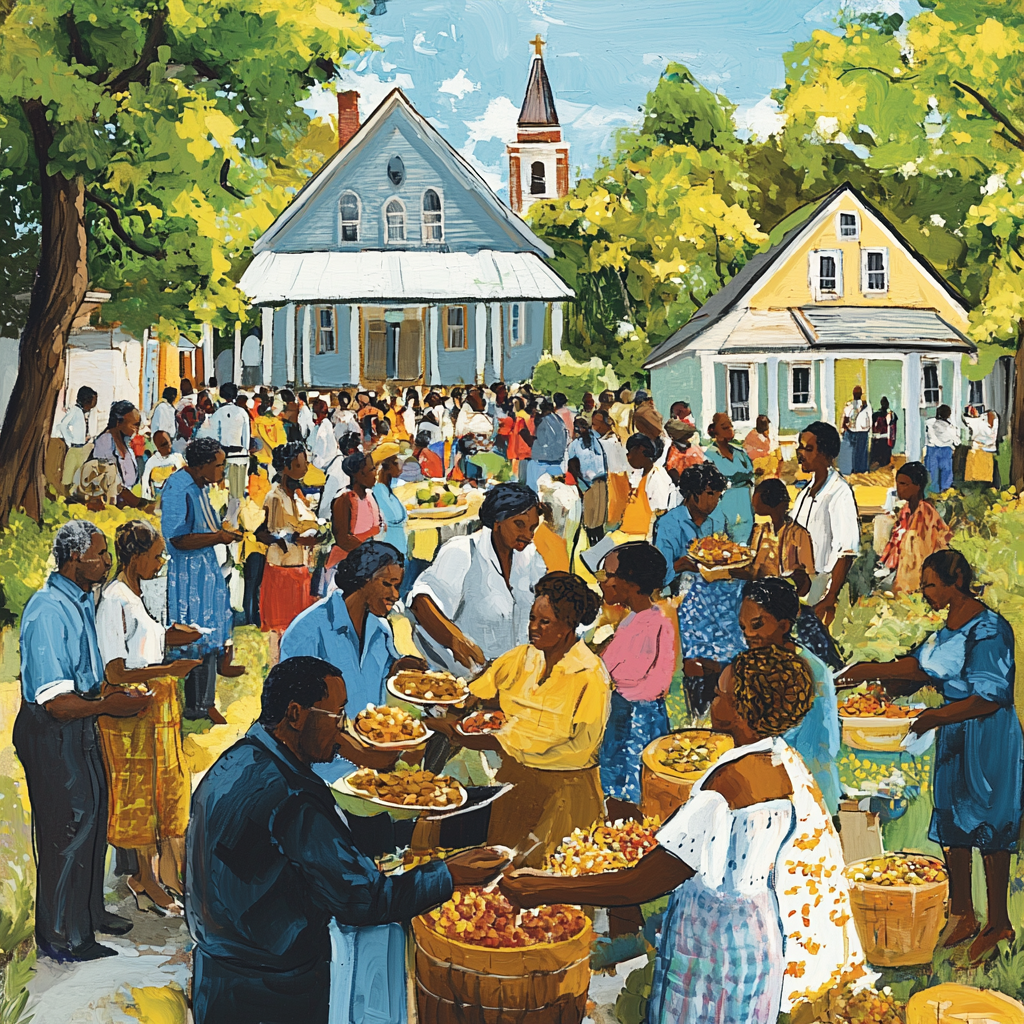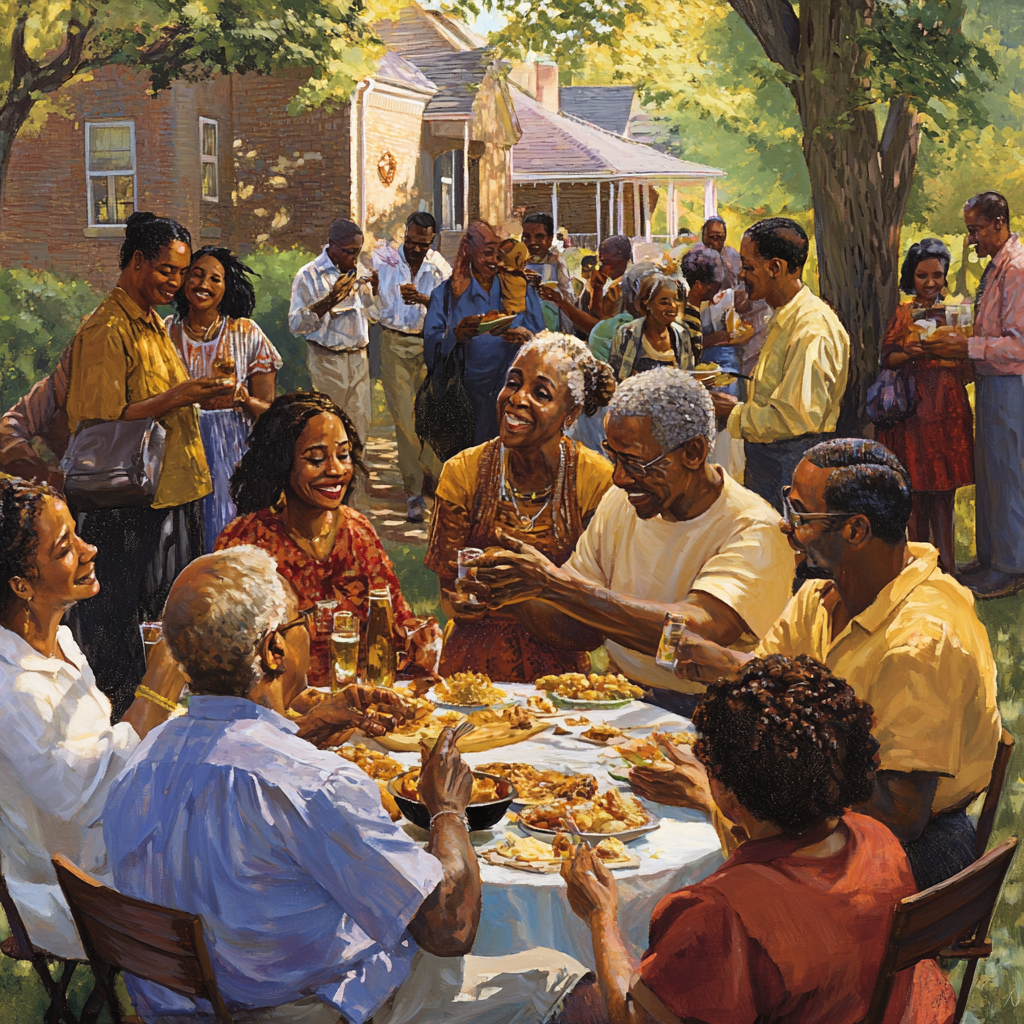Summary
Communalism is not just a tradition in Black communities; it’s a lifeline. Whether you’re in Africa, the Americas, or anywhere in the diaspora, the sense of shared responsibility and interconnectedness unites us. By supporting each other, participating in community life, and giving back, we ensure that we all thrive together. Let’s embrace this legacy and continue to strengthen our communities through unity.

Introduction
When we think of communalism, it’s not just an abstract concept it’s the heartbeat of Black communities around the world. At the core of communalism is the idea of shared responsibility, a belief that we are all interconnected, and that when one of us thrives, we all do. This principle has sustained Black families and communities, from Africa to the diaspora, for generations.
Growing up in a Nigerian home, I remember how my mother always said, “A tree does not make a forest.” This was her way of reminding us that we needed each other. This deep sense of supporting neighbors in times of need, participating in churches or community groups, and giving back is not just part of our culture; it’s our strength. In this article, we’ll dive into the essence of communalism in Black communities, its significance, and how it continues to shape our lives today.
What Is Communalism?
Communalism refers to a system where communities are organized around shared responsibilities, mutual aid, and a sense of interconnectedness. Unlike individualism, which prioritizes personal success, communalism emphasizes collective well-being. In Black communities, this belief transcends borders, whether you’re in Lagos, Harlem, or Kingston.
In African societies, communalism is ingrained in the fabric of life, influencing decision-making, family structures, and even economics. The saying, “It takes a village to raise a child,” is not just an old adage; it’s the embodiment of communal living. Similarly, in African American communities, the church often plays a central role in fostering communalism, offering support systems that extend beyond spiritual guidance.
Classification: Types of Communalism
Communalism manifests in several ways across different Black communities:
- Social: The essence of unity is visible in how Black communities rally around each other in times of need. Whether it’s a neighborhood fundraising event for someone’s medical bills or a community coming together to build homes, this type of communalism ensures that no one is left behind.
- Spiritual: Churches and religious organizations often serve as the backbone of Black communities. In African American and Caribbean communities, churches don’t just provide spiritual nourishment—they offer financial support, mentorship, and even career guidance.
- Economic: In African cultures, the practice of cooperatives, where groups pool resources to achieve shared goals, showcases economic communalism. Similarly, African American communities have long supported Black-owned businesses as a way to foster economic empowerment.
Generalization and Example: Shared Responsibility in Action
Take a moment to reflect on how communalism shows up in your life. For me, it was the weekly visits to our neighbor’s house where we all sat together for Sunday dinners. It wasn’t just a meal; it was a lesson in community care. From the older women in the neighborhood teaching us kids how to braid hair to the uncles who gave out advice about everything from school to relationships this was communalism in action.
The science backs this up, too. Studies show that communal support systems, especially in Black communities, lead to better mental health outcomes. When we share our burdens with others, we reduce stress and improve our overall well-being . It’s not just cultural wisdom; it’s scientific fact.

FAQ: Why Is Communalism So Important in Black Communities?
Q: Why does communalism play such a crucial role in Black communities?
A: The legacy of colonization, slavery, and systemic oppression has forced Black communities to rely on each other for survival. From forming underground railroads to creating independent schools and businesses, communalism has been a tool for resilience.
Q: Does communalism only exist in African and African American communities?
A: While it is deeply rooted in African traditions, its spirit is present across Black communities globally, including Caribbean, Afro-Latino, and other diasporic communities.
Cause and Effect: How Communalism Affects Black Families Globally
The interconnectedness can be seen clearly in how Black families operate globally. In African families, communal living often involves multiple generations under one roof, each playing a role in the upbringing of the children. This creates a strong support network where elders pass down wisdom, and younger generations provide care.
In African American families, though many may not live in multi-generational households, the community plays a pivotal role. Whether it’s an aunt stepping in as a caregiver or church members organizing food drives, the community becomes an extension of the family.
The effect of this is clear: stronger social bonds, greater mental health stability, and a deep sense of belonging. Without communalism, Black families would have faced even greater challenges navigating the structural inequalities that exist in society today.
Comparison/Contrast: African Families vs. African American Families
Although communalism thrives in both African and African American communities, there are notable differences in how it’s practiced.
- African Families: In African cultures, communal living is often literal extended families live together, and resources are shared openly. The African concept of Ubuntu, meaning “I am because we are,” captures this beautifully.
- African American Families: While the sense of community is strong, it may manifest through institutions like churches or social clubs. African American families often rely on these external organizations for support, which play a central role in maintaining communal values.
Despite these differences, both cultures prioritize the collective well-being over individual gain, a value that’s become even more essential in today’s fast-paced, individualistic world.
List: How You Can Practice Communalism Today
If you’re wondering how to embrace communalism in your daily life, here are a few ideas:
- Volunteer in your community: Offer your time to local organizations or events that benefit the community.
- Support Black-owned businesses: By shopping local and supporting Black-owned brands, you contribute to the economic growth of your community.
- Mentor someone younger: Whether it’s a niece, nephew, or a neighborhood kid, sharing your experiences and guidance can have a lasting impact.
- Participate in local events: Attend neighborhood meetings, community block parties, or church functions. These gatherings build connections.
- Start a community initiative: It could be as simple as organizing a group for weekly walks or a local book club.
Sequence: How Communalism Evolves Over Time
Communalism has evolved alongside Black communities, adapting to new challenges while maintaining its core values. From the tight-knit villages of Africa to the bustling urban neighborhoods of African Americans, it has always been a tool for survival. What started as a necessity due to systemic oppression is now a celebration of Black unity, pride, and strength.
Conclusion: Communalism as a Path Forward
In a world that often values individualism, communalism reminds us of the power in collective strength. As Black women, we carry the torch of this tradition, ensuring that future generations continue to benefit from the support, love, and wisdom of their communities. Whether through family, church, or local organizations, this is what keeps us grounded and connected. And isn’t that what life is all about?


